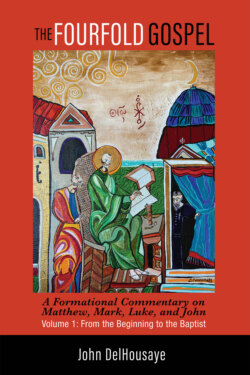Читать книгу The Fourfold Gospel, Volume 1 - John DelHousaye - Страница 6
На сайте Литреса книга снята с продажи.
Preface
ОглавлениеFor twenty years or so, Jesus and I met nearly every morning in the Gospels. He kindly heard my questions and hopes; I tried to listen, but the noise was almost overwhelming (tinnitus eventually added to the challenge). But we met, teacher to student, physician to patient, savior to sinner. He loved me, and I began to love him because I knew more of the beloved, the Spirit, who is love, and the unrelenting Lover. The Gospels have witnessed faithfully to this reality for two millennia, but must be seen and heard by each generation.
We enter God’s Kingdom (or, as John puts it, “eternal life”) through what Jesus calls the “faith of a mustard seed,” which is very small yet real. This is necessarily so: beliefs are not reality—they are often simplified or distorted—but direct our way in a strange world that would otherwise overwhelm us. All genuine human knowledge, I suspect, is but a drop in a still, dark sea. We are sponges to what we heard as children, learned in school, and see modeled around us. Everything is our teacher. Humans generally believe what is easiest to understand (“processing fluency”). These organizing filters deepen each day with each meeting of our mind and stimuli, so that reality and interpretation are nearly indistinguishable; they become a culture’s definition of sanity, the ability to think and behave normally. “He is out of his mind,” declared Jesus’s own family (Mark 3:21). In the Gospels, the crowds—many of whom had grown up hearing Scripture read and expounded in the synagogue, praying, and hoping in a messiah—are confused and do not trust Jesus. Even the disciples struggle to understand. After Christendom was underway, Antony of Egypt (c. 251–356), who left his culture to hear Jesus in the desert, said: “A time is coming when men will go mad, and when they see someone who is not mad, they will attack him saying, ‘You are mad, you are not like us.’”1 Christianity’s historical impact, particularly in the West, may disguise the reality that understanding Jesus is still difficult—indeed impossible—without the illumination of the Holy Spirit. That many today reject the gospel should not surprise. The Gospels suggest starting over in Jesus, who is one with our inherent God awareness (see Rom 1:21). The Jesuit theologian Karl Rahner (1904–1984) predicts that third-millennium Christians will have a “genuine experience of God emerging from the very heart of our existence,” or they will no longer be Christians.2
The Gospels invite the reader into a strange world, full of demons and the devil, but I suggest they are strangers to our beliefs about them. Several fields of knowledge have been drawn to the same mysteries, offering their own frames. But how well does the university understand evil and oppression, which are unavoidable in human experience? Anselm of Canterbury (1033–1109) describes this path as fides quaerens intellectum (“faith seeking understanding”).3 Jesus comes to each of us in the darkness, and, without explanation, says, “follow me.” Mirroring this summons, the Gospels offer a narrative depiction of reality—a necessary simplification, a model.4 The faith of a mustard seed allows readers to participate in the story, to begin a pilgrimage, while allowing space for illumination and growth.
1. Ward, Sayings of the Desert Fathers, 6.
2. Rahner, Theological Investigations, 20:149; see Egan, Ignatius Loyola, 13–14; Carroll, “Moving Mysticism to the Center,” 41–52.
3. Anselm, Proslogion, 1–6.
4. Bruner, “Narrative Construction of Reality,” 1–20; see Powell, What Is Narrative Criticism, 23.
